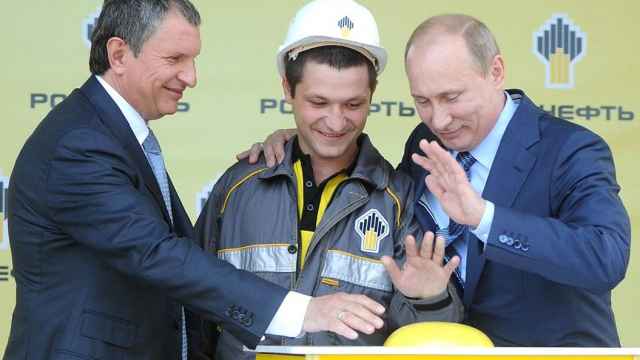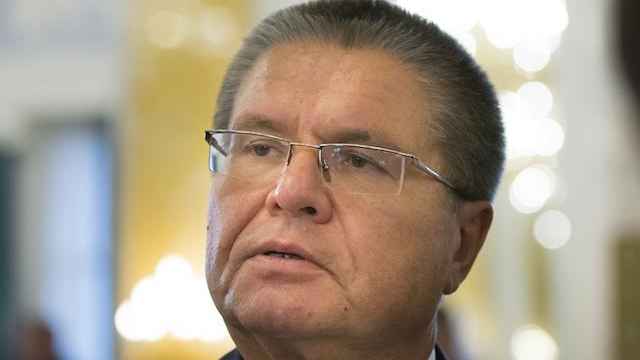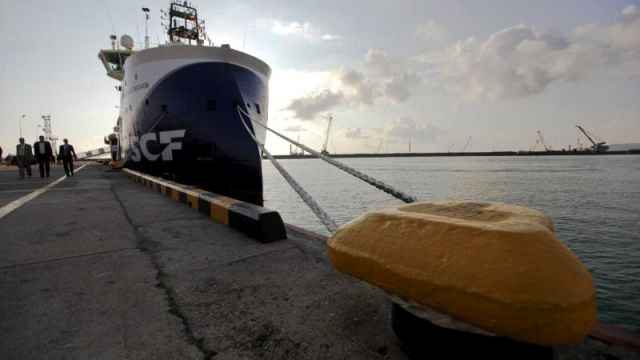On the surface, it was a simple business transaction: The government would sell shares in several key state companies to private investors. The investors’ money would help fill the country’s rapidly draining state coffers. Everyone would walk away happy.
Even the name for the process — privatization — suggested a kind of dull efficiency.
It was anything but. Struggles broke out between state company leaders and economic officials. Strange privatization schemes emerged and disappeared. A high ranking official was arrested. In two of three cases, something appears to be wrong.
When the dust cleared, the Kremlin had successfully sold stakes in three state-controlled companies: diamond miner Alrosa, regional oil company Bashneft, and oil giant Rosneft.
It was a major victory for the Kremlin. Against the odds, Russia managed to overcome a poor economic environment and Western sanctions to achieve a successful transaction. At least that’s what officials would say.
Others were left wondering: Is this really privatization? And if so, who is the privatizer?
Alrosa
The story began simply enough: In July, without particular conflict or fanfare, Russia sold a 10.9 percent stake in Alrosa, the world’s largest diamond miner, to a mix of European, Asian, Middle Eastern, and even American investors. The state-backed Russian Direct Investment Fund also purchased 35 percent of the available shares. The sale earned the government 52.2 billion rubles ($845 million.)
It was a good start to a campaign facing real challenges. The planned privatization of several other state companies had already been delayed. The Alrosa sale was a clear example of real, successful privatization.
However, two and a half months later, Alrosa shares closed at 38 percent higher than their July sale price. According to Bloomberg, the shares’ appreciation effectively meant that the Russian government lost 20 billion rubles ($323 million).
Bashneft
Fundamental problems emerged when the government moved on to the next item on its for sale list: Bashneft. The Bashkortostan-based oil company had been seized from Russian oligarch Vladimir Evtushenkov and re-nationalized in 2014. Now the government — which owned 50.08 percent of the company — was struggling to exit.
Around 50 companies were invited to participate, but, ultimately, the oil behemoth, Rosneft, expressed the keenest interest. Could a state-controlled company privatize a state firm? The government seemed to agree that this would not be privatization, but “moving the same money around,” as one official told the Vedomosti newspaper.
In the end, Rosneft made the Kremlin an offer it could hardly refuse: Rosneft would purchase a controlling stake in Bashneft for $5 billion dollars, a higher price than any other prospective buyer. Following the government’s established privatization plan, a 19.5 percent stake in the enlarged Rosneft would then be privatized for $11 billion. The two sales would net the Kremlin a total of $16 billion dollars. In October, Rosneft made the purchase.
Rosneft
Privatizing 19.5 percent of Rosneft, the world’s largest publicly traded oil company, proved an even greater challenge. There appeared to be few buyers capable of shouldering the financial burden of such a purchase. What’s more, Rosneft had fallen under United States and European Union sanctions in connection with the Ukraine crisis, further restricting the pool of potential investors.
Over the summer, rumors suggested that the Chinese National Petroleum Corporation would privatize Rosneft. One reported sticking point was that the Chinese wanted more operational control over the company. After Rosneft “privatized” Bashneft, it appeared Rosneft would then “self-privatize,” buying the 19.5 percent stake from its majority shareholder, state holding company Rosneftegaz.
Next, Russian media reported that President Putin had asked Lukoil CEO Vagit Alekperov to take part in the Rosneft’s privatization.
“When they didn’t find any foreign buyers for Rosneft, it was a big blow to the image that the government is promoting,” Vladimir Milov, president of the Institute of Energy Policy, told The Moscow Times. By involving Lukoil, the Kremlin was trying to save face.
But the Lukoil deal also fell through. It appeared that Rosneft would indeed “privatize” itself in a buyback. Then, in November, Economic Development Minister Alexei Ulyukayev was arrested on corruption charges in Rosneft’s office, adding another strange twist to an already convoluted story.
Finally, earlier this month, came the abrupt announcement by President Putin and Rosneft CEO Igor Sechin that a consortium of the British-Swiss commodities trading firm Glencore and the Qatari Sovereign Wealth Fund would purchase the 19.5 percent stake. The unexpected deal reportedly came after talks with 30 different potential investors.
Putin termed the sale “the largest on the global energy market in 2016.”
Since then, many have cast doubt on the honesty of this “privatization.” In the deal’s wake, Glencore and Rosneft announced that the 19.5 percent share had been valued at 10.2 billion euros ($10.5 billion). The Glencore-Qatar consortium would pay 2.8 billion euros ($2.9 billion) and the obscure Italian bank Intesa Sanpaolo and several unnamed Russian banks would provide a loan of 7.4 billion euros ($7.7 billion) — with Intesa providing more than 50 percent of the financing.
Now, Intesa appears to be reconsidering its role due to EU sanctions. Additionally, the RBC news site has reported that Gazprombank, a bank with strong ties to Rosneft, will help finance the purchase. In October, the Russian government allowed Rosneftegaz, Rosneft’s majority shareholder, to deposit up to 1.8 trillion rubles ($29.2 billion) in Gazprombank. Some have speculated this money could be used to finance Rosneft’s privatization.
Economic analyst Boris Grozovsky suggests a different explanation: In early December, Rosneft issued 600 billion rubles ($9.8 billion) in bonds. The Central Bank used these bonds as collateral to provide loans to Gazprombank and other Russian banks. These banks financed the purchase of the 19.5 percent stake from stateowned Rosneftegaz, which passed the money into the Russian budget. Glencore and the Qatari Fund masked the process.
The issue is that the Russian banks are now in debt, Grozovsky says. Financing from Intesa was supposed to solve this problem – at least partially. Now that the Italian bank is backtracking, however, the Russian banks may have a problem.
Regardless of the explanation, much remains unclear. But for many analysts, it appears that the sale of Rosneft’s shares — like that of Bashneft’s — was privatization in name only.
“The picture isn’t changing,” says Sergei Romanchuk, head of money markets at Metallinvestbank. “The goal of privatization is to de-monopolize the market, but that isn’t happening here.”

A Message from The Moscow Times:
Dear readers,
We are facing unprecedented challenges. Russia's Prosecutor General's Office has designated The Moscow Times as an "undesirable" organization, criminalizing our work and putting our staff at risk of prosecution. This follows our earlier unjust labeling as a "foreign agent."
These actions are direct attempts to silence independent journalism in Russia. The authorities claim our work "discredits the decisions of the Russian leadership." We see things differently: we strive to provide accurate, unbiased reporting on Russia.
We, the journalists of The Moscow Times, refuse to be silenced. But to continue our work, we need your help.
Your support, no matter how small, makes a world of difference. If you can, please support us monthly starting from just $2. It's quick to set up, and every contribution makes a significant impact.
By supporting The Moscow Times, you're defending open, independent journalism in the face of repression. Thank you for standing with us.
Remind me later.






